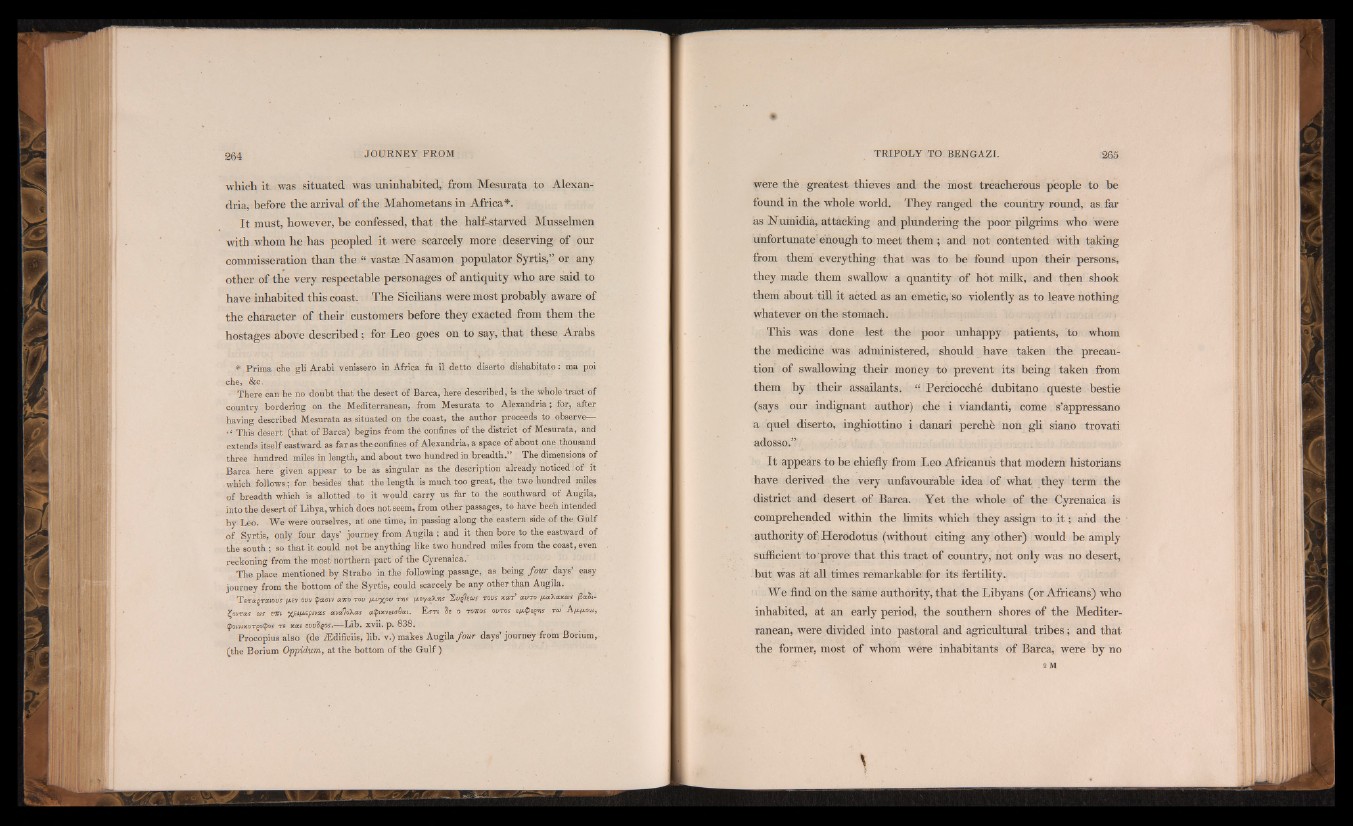
which it was situated was uninhabited, from Mesurata to Alexandria,
before the arrival of the Mahometans in Africa*.
I t must, however, be confessed, that the half-starved Musselmen
with whom he has peopled it were scarcely more deserving of our
commisseration than the | vastæ Nasamon populator Syrtis,” or any
other of the very respectable personages of antiquity who are said to
have inhabited this coast. The Sicilians were most probably aware of
the character of their customers before they exacted from them the
hostages above described ; for Leo goes on to say, that these Arabs
* Prima che gli Arabi venissero in Africa fu il detto diserto dishabitato : ma poi
che, &c.
There can be no doubt that the desert of Barca, here described, is the whole tract of
country bordering on the Mediterranean, from Mesurata to Alexandria for, after
having described Mesurata as situated on the coast, the author proceeds to observe
“ This desert (that of Barca) begins from the confines of the district of Mesurata, and
extends itself eastward as far as the confines of Alexandria, a space of about one thousand
three hundred miles in length, and about two hundred in breadth. The dimensions of
Barca here given appear to be as singular as the description already noticed . of it
which follows; for besides that the length is much too great, the two hundred miles
of breadth which is allotted to it would, carry us far to the southward of Augila,
into the desert of Libya, which does not seem, from other passages, to have been intended
by Leo. We were ourselves, at one time, in passing along the eastern ride of the Gulf
of Syrtis, only four days’ journey from Augila ; and it then bore to the eastward of
the south ; so that it could not be anything like two hundred miles from the coast, even
reckoning from the most northern part of the Cyrenaica.
The place mentioned by Strabo in the following passage, as being fo u r days’ easy
journey from the bottom of the Syrtis, could scarcely be any other than Augila.
TeTaçTfitiOvr [aev oyv (pstaiv alto ro v putiypv t d s taeyopons S u ç I e c o s t o u s K a r a v t o ia c cX c o lu s fia S t-
ÇavTas (as sm ypiiaepivas ènaflàkets apijeveiffôai. E a n Se o t o e f o s ovros EfalpEgd s rta A/afaovi,
(poivixorgoÇo? te xai evuSços.—Lib. xvii. p. 838.
Procopius also (de Ædificiis, lib. v.) makes Augila four days’ journey from Borium,
(the Borium Oppidum, at the bottom of the Gulf )
were the greatest thieves and the most treacherous people to be
found in the whole world. They ranged the country round, as far
as Numidia, attacking and plundering the poor pilgrims who were
unfortunate enough to meet them ; and not contented with taking
from them everything that was to be found upon their persons,
they made them swallow a quantity of hot milk, and then shook
them about till it acted as an emetic, so violently as to leave nothing
whatever on the stomach.
This was done lest the poor unhappy patients, to whom
the medicine was administered, should have taken the precaution
of swallowing their money to prevent its being taken from
them by their assailants. “ Perciocché dubitano .queste bestie
(says our indignant author) che i viandanti, come s’appressano
a quel diserto, inghiottino i danari perchè non gli siano trovati
adesso,Ti
I t appears to be chiefly from Leo Africanus that modern historians
have derived the very unfavourable idea of what they term the
district and desert of Barca. Yet the whole of the Cyrenaica is
comprehended within the limits which they assign to it ; and the
authority of; Herodotus (without citing any other) would be amply
sufficient to ’prove that this tract of country, not only was no desert,
but was at all times remarkable: for its fertility.
We find on the same authority, that the Libyans (or Africans) who
inhabited, at an early period, the southern shores of the Mediterranean,
were divided into pastoral and agricultural tribes ; and that
the former, most of whom were inhabitants of Barca, were by no